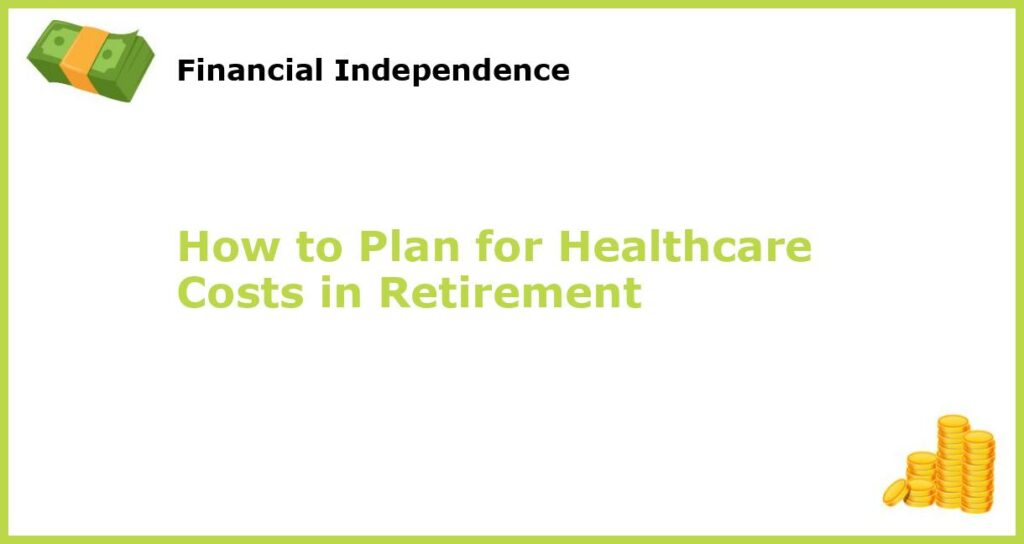Retirement is an exciting time in life, but it can also be expensive. One major expense to consider is healthcare costs. As you age, it’s likely that you will need more frequent medical care and treatments, which can add up quickly. However, with careful planning and preparation, you can ensure that you are financially prepared for your healthcare needs in retirement. Here are 10 tips to help you plan for healthcare costs in retirement.
1. Start Planning Early

When it comes to planning for healthcare costs in retirement, the earlier you start, the better. Starting early gives you more time to save and invest for your future healthcare needs. You can take advantage of tax-advantaged retirement accounts like an IRA or 401(k) to help you save more money. Starting early also allows you to make adjustments to your retirement plan as needed.
For example, if you realize in your 50s that you may not have enough savings to cover your healthcare costs in retirement, you have time to adjust your plan. You may choose to work a few additional years or make changes to your investment strategy to help you save more money. The earlier you start planning, the more options you have.
2. Consider Long-Term Care Insurance

Long-term care insurance is designed to help cover the cost of care when you are unable to care for yourself, such as nursing home care or in-home care. This type of insurance can be expensive, but it can also provide peace of mind knowing that you will have financial support if you need it.
It’s important to note that long-term care insurance may not be the best option for everyone. If you have a substantial amount of savings or if you have family members who can help care for you, you may not need long-term care insurance. However, if you are concerned about the cost of long-term care and want to protect your assets, long-term care insurance may be a good choice.
3. Research Medicare and Supplemental Plans

Medicare is a federal healthcare program for people who are 65 or older, as well as younger people with certain disabilities or illnesses. However, Medicare does not cover all healthcare expenses, so it’s important to research supplemental plans, such as Medigap or Medicare Advantage, to help you cover those costs.
Keep in mind that these supplemental plans come with their own costs, such as premiums and deductibles. It’s important to weigh the costs and benefits of each plan to determine which one is right for you. Researching and comparing Medicare and supplemental plans can help you save money on healthcare costs in retirement.
4. Review Your Health History

When planning for healthcare costs in retirement, it’s important to review your health history and assess your potential healthcare needs. Consider any chronic conditions or illnesses you currently have, as well as any family history of health issues. This can help you plan for potential medical expenses and treatments you may need down the road.
For example, if you have a family history of cancer, you may want to consider saving more money for potential cancer treatments in the future. On the other hand, if you have always been healthy and have no family history of health issues, you may not need to save as much for healthcare costs in retirement.
5. Create a Budget for Healthcare Costs

Creating a budget for healthcare costs can help you better prepare for retirement. Consider the cost of premiums, deductibles, and copays, as well as potential out-of-pocket expenses for medical procedures or treatments. Don’t forget to also factor in any long-term care costs you may incur.
When creating your budget, be realistic about your healthcare needs. If you have a chronic condition, you may need to budget more money for medical care. If you are relatively healthy, you may be able to budget less. Creating a budget can help you avoid surprises and ensure that you are financially prepared for your healthcare needs in retirement.
6. Build an Emergency Fund
Having an emergency fund can be incredibly helpful when unexpected healthcare costs arise. Aim to save 3-6 months’ worth of living expenses in an easily accessible savings account. This emergency fund can help you cover unexpected medical expenses without having to dip into your retirement savings.
It’s important to note that your emergency fund should be separate from your retirement savings. Your emergency fund should be easily accessible and should not be invested in the stock market or other high-risk investments. Building an emergency fund can help you feel more prepared for unexpected healthcare costs in retirement.
7. Stay Active and Healthy
Staying active and healthy can help you not only feel better in retirement but also potentially reduce your need for medical care. This can help you save money on healthcare costs and live a happier, healthier life overall.
There are many ways to stay active and healthy in retirement, such as exercising regularly, eating a healthy diet, and getting enough sleep. Making healthy choices can also help you avoid chronic health conditions that may require expensive medical care. Staying active and healthy is a win-win for your health and your wallet.
8. Talk to Your Financial Advisor
A financial advisor can help you create a retirement plan that incorporates your healthcare costs. They can help you determine the best investment strategies and insurance options to help you reach your retirement goals.
Your financial advisor can also help you make adjustments to your retirement plan as needed, based on changing healthcare costs or other factors. Working with a financial advisor can provide peace of mind knowing that you have a professional on your side helping you navigate the complex world of retirement planning.
9. Consider Health Savings Accounts
Health savings accounts (HSAs) are tax-advantaged accounts designed to help you save money for healthcare expenses. These accounts can be used in conjunction with a high-deductible healthcare plan and can provide significant tax benefits.
Money contributed to an HSA is tax-deductible, and withdrawals used for qualified medical expenses are tax-free. HSAs can help you save money on healthcare costs in retirement and can be a valuable tool for managing your healthcare expenses.
10. Update Your Estate Plan
Updating your estate plan can help ensure that your healthcare wishes are carried out and that your assets are distributed according to your wishes. Consider creating a living will to outline your healthcare preferences and choose a healthcare power of attorney to make medical decisions on your behalf if you are unable to do so.
Your estate plan should also consider the potential cost of long-term care and how it will be paid for. Discussing these issues with your family and estate planning attorney can help ensure that your wishes are carried out and that you are financially prepared for your healthcare needs in retirement.







